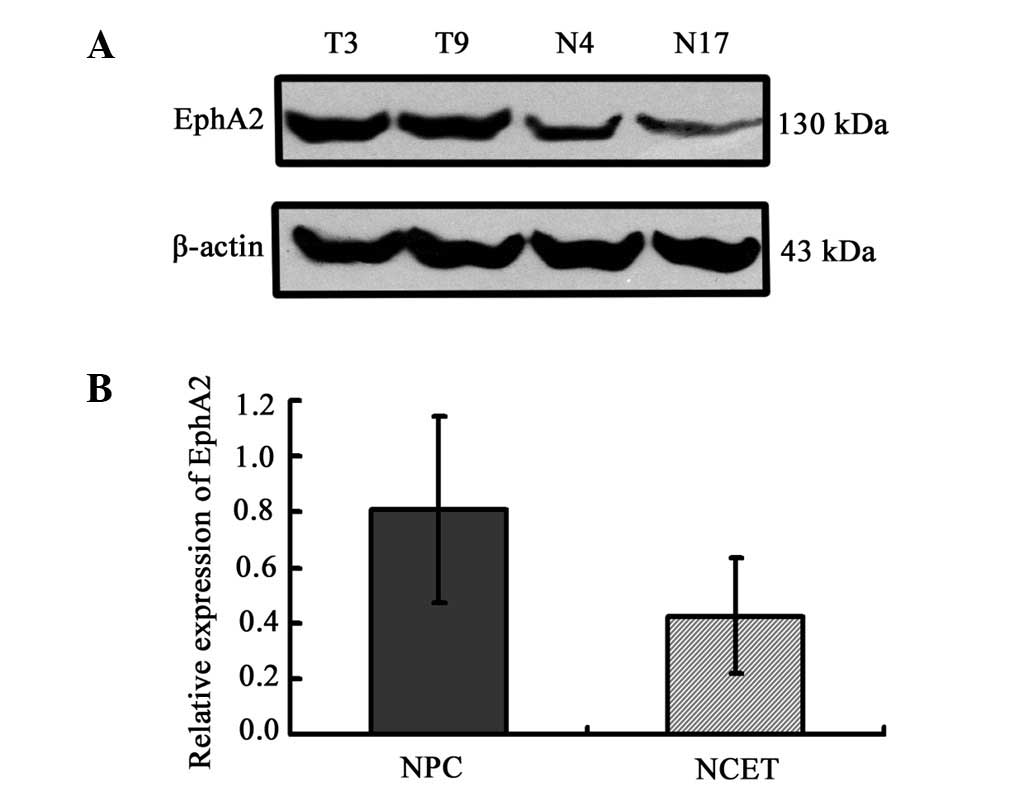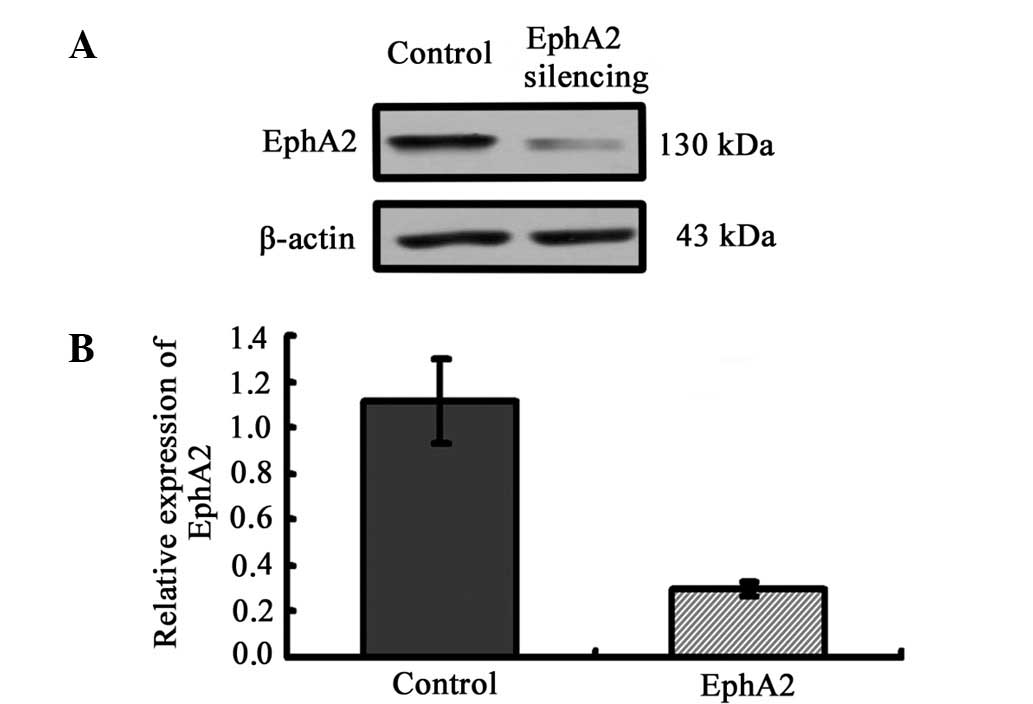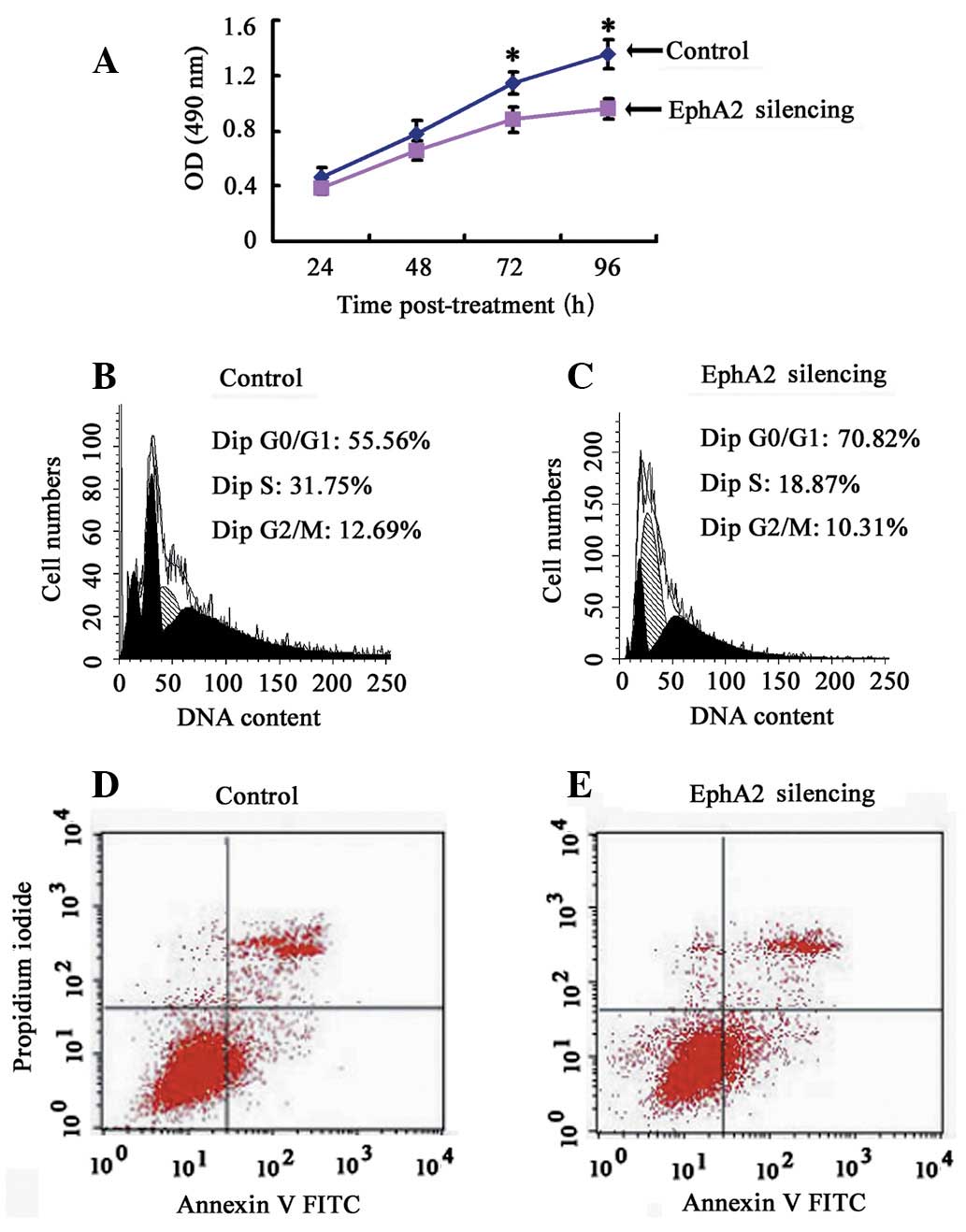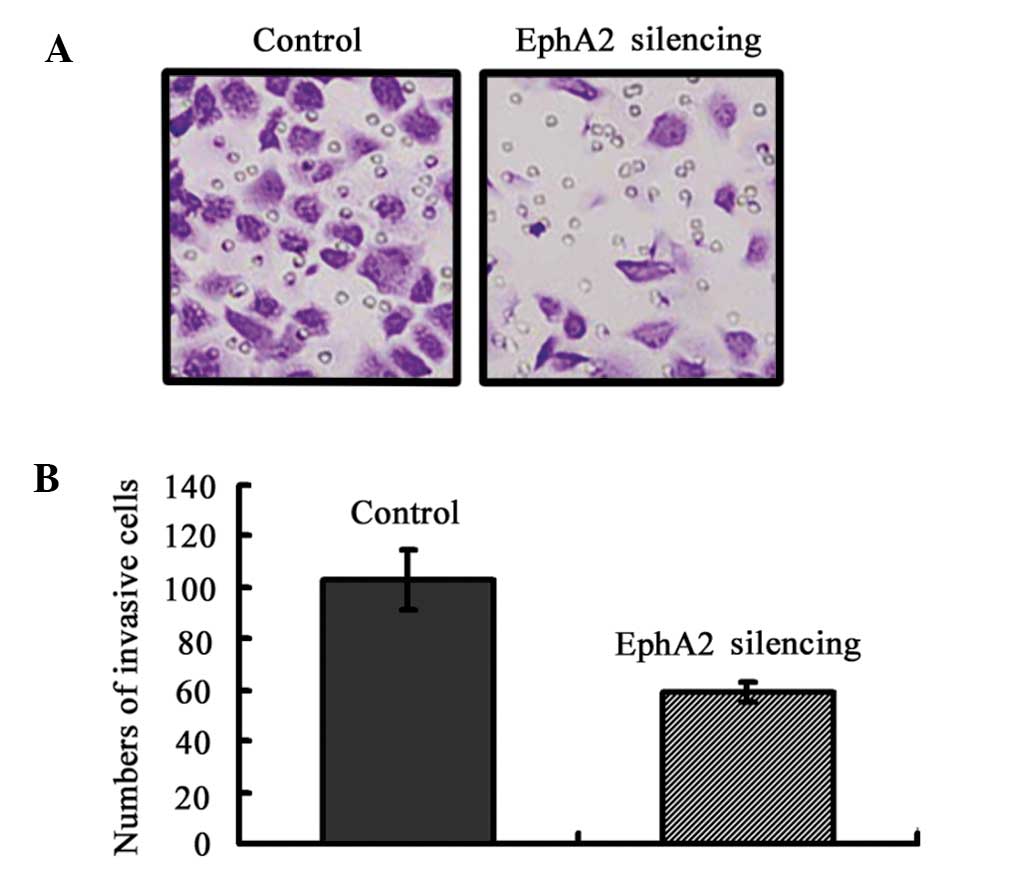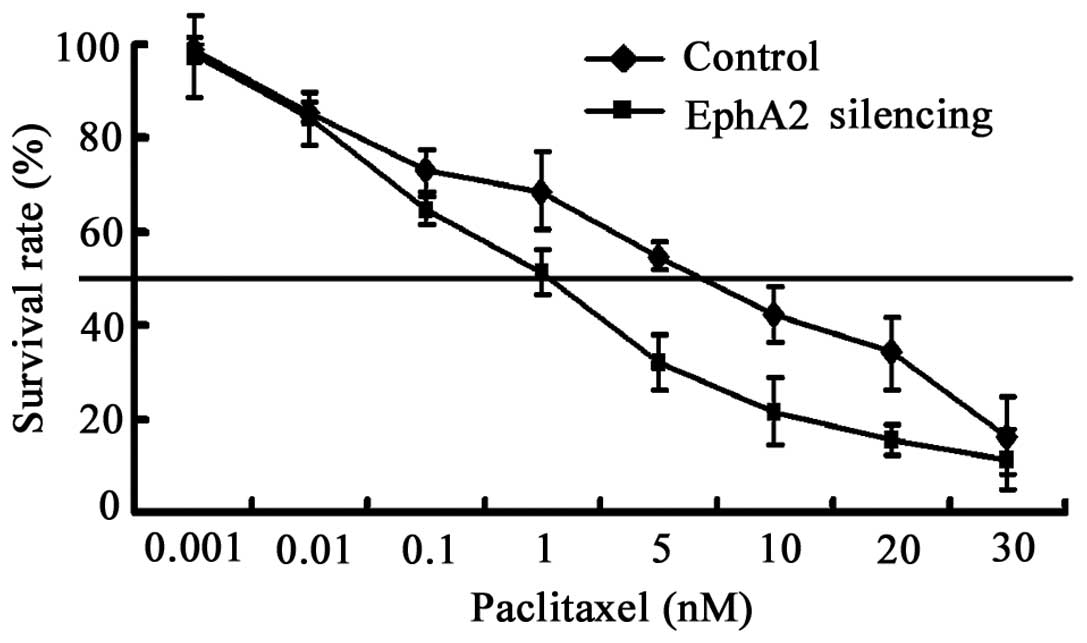|
1
|
Fahraeus R, Fu HL, Ernberg I, et al:
Expression of Epstein-Barr virus-encoded proteins in nasopharyngeal
carcinoma. Int J Cancer. 42:329–338. 1988. View Article : Google Scholar : PubMed/NCBI
|
|
2
|
Shanmugaratnam K: Nasopharyngeal
carcinoma: epidemiology, histopathology and aetiology. Ann Acad Med
Singapore. 9:289–295. 1980.PubMed/NCBI
|
|
3
|
Jemal A, Siegel R, Xu J and Ward E: Cancer
statistics. CA Cancer J Clin. 60:277–300. 2010.
|
|
4
|
Teo P, Shiu W, Leung SF and Lee WY:
Prognostic factors in nasopharyngeal carcinoma investigated by
computer tomography - an analysis of 659 patients. Radiother Oncol.
23:79–93. 1992. View Article : Google Scholar : PubMed/NCBI
|
|
5
|
Tan EH, Khoo KS, Wee J, et al: Phase II
trial of a paclitaxel and carboplatin combination in Asian patients
with metastatic nasopharyngeal carcinoma. Ann Oncol. 10:235–237.
1999. View Article : Google Scholar : PubMed/NCBI
|
|
6
|
Pasquale EB: Eph receptors and ephrins in
cancer: bidirectional signalling and beyond. Nat Rev Cancer.
10:165–180. 2010. View
Article : Google Scholar : PubMed/NCBI
|
|
7
|
Pasquale EB: Eph-ephrin bidirectional
signaling in physiology and disease. Cell. 133:38–52. 2008.
View Article : Google Scholar : PubMed/NCBI
|
|
8
|
Sulman EP, Tang XX, Allen C, et al: ECK, a
human EPH-related gene, maps to 1p36.1, a common region of
alteration in human cancers. Genomics. 40:371–374. 1997. View Article : Google Scholar : PubMed/NCBI
|
|
9
|
Brantley-Sieders DM, Zhuang G, Hicks D, et
al: The receptor tyrosine kinase EphA2 promotes mammary
adenocarcinoma tumorigenesis and metastatic progression in mice by
amplifying ErbB2 signaling. J Clin Invest. 118:64–78. 2008.
View Article : Google Scholar
|
|
10
|
Lu C, Shahzad MM, Wang H, et al: EphA2
overexpression promotes ovarian cancer growth. Cancer Biol Ther.
7:1098–1103. 2008. View Article : Google Scholar : PubMed/NCBI
|
|
11
|
Zelinski DP, Zantek ND, Stewart JC,
Irizarry AR and Kinch MS: EphA2 overexpression causes tumorigenesis
of mammary epithelial cells. Cancer Res. 61:2301–2306.
2001.PubMed/NCBI
|
|
12
|
Zantek ND, Azimi M, Fedor-Chaiken M, Wang
B, Brackenbury R and Kinch MS: E-cadherin regulates the function of
the EphA2 receptor tyrosine kinase. Cell Growth Differ. 10:629–638.
1999.PubMed/NCBI
|
|
13
|
Lin YG, Han LY, Kamat AA, et al: EphA2
overexpression is associated with angiogenesis in ovarian cancer.
Cancer. 109:332–340. 2007. View Article : Google Scholar : PubMed/NCBI
|
|
14
|
Han L, Dong Z, Qiao Y, et al: The clinical
significance of EphA2 and Ephrin A-1 in epithelial ovarian
carcinomas. Gynecol Oncol. 99:278–286. 2005. View Article : Google Scholar : PubMed/NCBI
|
|
15
|
Brannan JM, Dong W, Prudkin L, et al:
Expression of the receptor tyrosine kinase EphA2 is increased in
smokers and predicts poor survival in non-small cell lung cancer.
Clin Cancer Res. 15:4423–4430. 2009. View Article : Google Scholar : PubMed/NCBI
|
|
16
|
Liu F, Park PJ, Lai W, et al: A
genome-wide screen reveals functional gene clusters in the cancer
genome and identifies EphA2 as a mitogen in glioblastoma. Cancer
Res. 66:10815–10823. 2006. View Article : Google Scholar : PubMed/NCBI
|
|
17
|
Taddei ML, Parri M, Angelucci A, et al:
EphA2 induces metastatic growth regulating amoeboid motility and
clonogenic potential in prostate carcinoma cells. Mol Cancer Res.
9:149–160. 2011. View Article : Google Scholar : PubMed/NCBI
|
|
18
|
Herrem CJ, Tatsumi T, Olson KS, et al:
Expression of EphA2 is prognostic of disease-free interval and
overall survival in surgically treated patients with renal cell
carcinoma. Clin Cancer Res. 11:226–231. 2005.PubMed/NCBI
|
|
19
|
Liu Y, Xie C, Zhang X, et al: Elevated
expression of HMGB1 in squamous-cell carcinoma of the head and neck
and its clinical significance. Eur J Cancer. 46:3007–3015. 2010.
View Article : Google Scholar : PubMed/NCBI
|
|
20
|
Liu Y, Zhang X, Qiu Y, et al: Clinical
significance of EphA2 expression in squamous-cell carcinoma of the
head and neck. J Cancer Res Clin Oncol. 137:761–769. 2011.
View Article : Google Scholar : PubMed/NCBI
|
|
21
|
Johnson FM, Garden AS, Palmer JL, et al: A
phase I/II study of neoadjuvant chemotherapy followed by radiation
with boost chemotherapy for advanced T-stage nasopharyngeal
carcinoma. Int J Radiat Oncol Biol Phys. 63:717–724. 2005.
View Article : Google Scholar : PubMed/NCBI
|
|
22
|
Liu Y, Yu C, Qiu Y, et al: Downregulation
of EphA2 expression suppresses the growth and metastasis in
squamous-cell carcinoma of the head and neck in vitro and in vivo.
J Cancer Res Clin Oncol. 138:195–202. 2012. View Article : Google Scholar : PubMed/NCBI
|
|
23
|
Zhu G, Xiao D, Chen Q and Zhu Y: The
expression and its potentially clinical significance of EphA2 in
nasopharyngeal carcinoma. Lin Chung Er Bi Yan Hou Tou Jing Wai Ke
Za Zhi. 25:827–829. 8332011.(In Chinese).
|
|
24
|
Abraham S, Knapp DW, Cheng L, et al:
Expression of EphA2 and Ephrin A-1 in carcinoma of the urinary
bladder. Clin Cancer Res. 12:353–360. 2006. View Article : Google Scholar : PubMed/NCBI
|
|
25
|
Brannan JM, Sen B, Saigal B, et al: EphA2
in the early pathogenesis and progression of non-small cell lung
cancer. Cancer Prev Res (Phila). 2:1039–1049. 2009. View Article : Google Scholar : PubMed/NCBI
|
|
26
|
Kinch MS, Moore MB and Harpole DH Jr:
Predictive value of the EphA2 receptor tyrosine kinase in lung
cancer recurrence and survival. Clin Cancer Res. 9:613–618.
2003.PubMed/NCBI
|
|
27
|
King AD, Ahuja AT, Leung SF, et al: Neck
node metastases from nasopharyngeal carcinoma: MR imaging of
patterns of disease. Head Neck. 22:275–281. 2000. View Article : Google Scholar : PubMed/NCBI
|
|
28
|
Leung SF, Teo PM, Shiu WW, Tsao SY and
Leung TW: Clinical features and management of distant metastases of
nasopharyngeal carcinoma. J Otolaryngol. 20:27–29. 1991.PubMed/NCBI
|
|
29
|
Ciuleanu TE, Fountzilas G, Ciuleanu E,
Plataniotis M, Todor N and Ghilezan N: Paclitaxel and carboplatin
in relapsed or metastatic nasopharyngeal carcinoma: a multicenter
phase II study. J BUON. 9:161–165. 2004.PubMed/NCBI
|
|
30
|
Landen CN Jr, Chavez-Reyes A, Bucana C, et
al: Therapeutic EphA2 gene targeting in vivo using neutral
liposomal small interfering RNA delivery. Cancer Res. 65:6910–6918.
2005. View Article : Google Scholar : PubMed/NCBI
|















